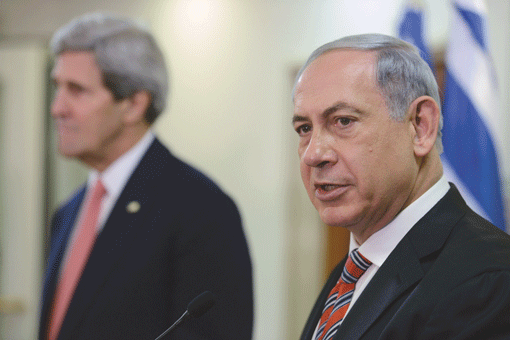PA head Abbas aide said language in proposed interim agreement contradicts what was promised by Obama administration
By RON KAMPEAS
WASHINGTON (JTA) — Amid simmering tensions over Iran policy, the Obama and Netanyahu governments appear to have quietly forged common ground in recent weeks on Israeli-Palestinian talks, with the United States accepting that a possible “framework” agreement might not address every outstanding issue in the negotiations.
Such an agreement, the United States and Israel seem to agree, would maintain a role for Israel in providing for its security, presumably by maintaining some form of military presence in the West Bank.
What’s not clear is if the Palestinians will go along.

As recently as October, Martin Indyk, the lead American peace negotiator, told J Street that an interim agreement was not in the cards. The objective, he told the liberal Israel policy group, was a final-status agreement.
Yet over the weekend of Dec. 6-8, addressing the annual Saban Forum in Washington, President Obama and Secretary of State John Kerry each suggested there would be a middle phase aimed at addressing Israel’s lingering security concerns.
“I think it is possible over the next several months to arrive at a framework that does not address every single detail but gets us to a point where everybody recognizes better to move forward than move backwards,” Obama told the annual forum on Dec. 7.
“We have spent a lot of time working with Prime Minister Netanyahu and his entire team to understand from an Israeli perspective what is required for the security of Israel in such a scenario,” he said.
Netanyahu’s comments to the forum, delivered the next day via satellite, reiterated Israel’s longstanding position that under any agreement, it must retain the ability to provide for its own security.
“I think that any kind of peace we’ll have is likely, initially at least, to be a cold peace,” Netanyahu said. “So there must be ironclad security arrangements to protect the peace, arrangements that allow Israel to defend itself by itself against any possible threat. And those arrangements must be based on Israel’s own forces.”
For years, the question of Israel’s long-term security presence in the West Bank has dogged attempts by Israel and the Palestinians to return to peace talks. Israel has long maintained that it must retain a security corridor in the Jordan Valley. Palestinian Authority President Mahmoud Abbas has said that keeping Israeli forces in place would fatally undermine a deal.
The Obama administration appears to have sided with Israel on this point by accepting that at least initially, Israel will have a role in securing borders and fighting terrorism in Palestinian areas, among other security responsibilities.
“Needless to say, for a period of time this will obviously involve Israeli participation,” Kerry told the Saban Forum. “It has to.”
On Dec. 9, Jen Psaki, the State Department spokeswoman, denied that references to a “framework” agreement implied the administration is backing away from its pursuit of a final-status agreement, though she declined to elaborate on what “framework” means.
“The secretary — and this may have caused some of the confusion — and the president both used the term ‘framework’ this weekend,” Psaki said at her daily media briefing. “I think some thought — took that to mean interim. It does not mean interim. We still remain focused on a final-status agreement.”
Nevertheless, the administration’s language was perceived as marking a dramatic departure from previous understandings.
“This contradicts completely what we were promised by the American secretary of state at the beginning of this peace process — to avoid any partial or interim agreements,” Yasser Abed Rabbo, a top Abbas aide, told the Voice of Palestine radio on Dec. 9, according to a report in the The Associated Press.
The shift follows a comprehensive review of Israeli security needs led by Gen. John Allen, a former commander of allied forces in Afghanistan. Allen was present at the Saban Forum but did not speak publicly.
Both Obama and Kerry suggested that they understood the shift would not be welcomed by the Palestinians.
“We’re going to have to see whether the Israelis agree and whether President Abbas, then, is willing to understand that this transition period requires some restraint on the part of the Palestinians as well,” Obama said. “They don’t get everything that they want on day one. And that creates some political problems for President Abbas, as well.”
Kerry said those who believe “there might be an unfairness” by making Israeli security a preeminent factor in advancing toward a peace deal should “look at the history and understand why that’s a fundamental reality.”
Jonathan Schanzer, the vice president of the Foundation for Defense of Democracies, said Israel might have demanded the shift in part because it needs strong security assurances in the wake of upheaval in neighboring Egypt and Syria. Israel also is concerned that the recent deal between world powers and Iran could spur rather than prevent the Islamic Republic’s pursuit of a nuclear weapon.
Schanzer, who just published State of Failure, a critique of Abbas’ governance, said Kerry deserved credit for keeping the parties at the table after differences over preconditions kept them apart for almost three years.
“The administration has exceeded all our expectations,” he said. “We’re halfway through a process that is still going.”



















